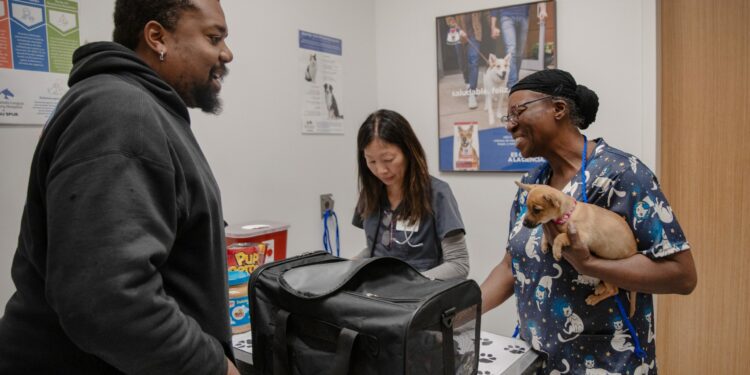Colorado voters approved a ballot measure to create a new, state-regulated veterinary position aimed at addressing the shortage of care, especially in rural areas, as votes were tallied on Thursday.
Proposition 129 establishes the position of veterinary professional associate, or VPA, and defines its educational requirements. Though the tally was too close project a winner on Tuesday night and throughout Wednesday, the yes votes had captured 52.4% of the total at 9:59 a.m. Thursday, with an estimated 77% of the votes counted when The Associated Press called the race. It needed a simple majority to pass.Â
VPAs will be allowed to provide more types of care considered within the scope of their qualifications, but only while under the supervision of a licensed veterinarian. The State Board of Veterinary Medicine will develop the precise parameters of those procedures and the level of supervision required.
While the current position of veterinary technician can perform some procedures, VPAs will have greater latitude in a clinical setting to provide routine care such as spay and neuter surgeries.
Proponents pushed the measure in response to a veterinary care shortage both nationally and in Colorado, where in 2021 the U.S. Department of Agriculture identified 25 rural counties as service shortage areas. Additionally, a Colorado State University survey of more than 700 veterinary professionals statewide revealed that 71% of respondents had to redirect clients at least once a week because they were unable to provide care.
“We are beyond thrilled, because we know we were the voice for the animals and the pet owners whose voices were not being heard,” said Apryl Steele, veterinarian and the president and CEO of the Dumb Friends League, a primary supporter of the proposition. “Despite a misinformation campaign and all of the funding that went into that, we prevailed, which tells us that people really, really do care about pets and understand the issue much more than maybe they were given credit for.”
Steele also noted that Colorado’s passage of the measure creates momentum for expanding the position nationwide.
Candidates for the VPA position must be at least 18 years old, hold a master’s degree in veterinary clinical care and be registered by the state. The CSU veterinary school has been working to build a master’s program for VPAs.
Those in favor of Proposition 129 argued that a new position with lower costs for tuition than what’s required to become a veterinarian could ultimately both increase access to care and lower consumer costs.
With rulemaking by the state board and approval of a degree program still to come, there remains considerable work ahead before VPAs can be integrated into the system, Steele said.
“We expect that the first graduates would be about three years from now,” she said. “So we have three years of work to figure out how do we teach veterinarians to delegate to VPAs? How do we integrate them into the health care team? How do we get people to really buy into this?
“We already know there are some real champions for this that are veterinarians, and they’re going to be early adopters. We’ll see those successes, and then eventually I have no doubt it will become a fabric of what we do and how we provide veterinary care.”
Opponents, led by the American Veterinary Medical Association trade group, said that a recently enacted law that expands the responsibilities of vet techs provided a better option for making care more readily available. They also contended that unqualified individuals could end up performing surgery and put animals at risk. Another argument against the proposition suggested that the new position was advanced for the financial benefit of colleges and would saddle candidates with student debt.
In a written statement, the opposition campaign Keep Our Pets Safe expressed “sadness” that the measure passed and concern about its consequences. It added that VPAs have been given “considerable authority over animals’ care without the training and accountability necessary to ensure they deliver that care competently and safely.”
It also said that the veterinary professionals in the group would work with state officials “to enact stringent regulations and safeguards that will protect Colorado’s animals and their owners.”
DFL’s Steele said that now is going to be “a phase of healing and coming together” within the animal care community.
“This created division where division is not necessary,” she said. “We are all invested in creating guardrails to make this safe and successful.”
The campaign committee All Pets Deserve Vet Care, backed primarily by the Dumb Friends League and the American Society for the Prevention of Cruelty to Animals, reported about $1.4 million in contributions toward advancing the ballot measure.
Keep Our Pets Safe, the group opposing the proposition, reported about $2.4 million in cash and in-kind contributions.
Type of Story: News
Based on facts, either observed and verified directly by the reporter, or reported and verified from knowledgeable sources.
Source link : http://www.bing.com/news/apiclick.aspx?ref=FexRss&aid=&tid=672dd9e8ca8947ae879638f952521460&url=https%3A%2F%2Fcoloradosun.com%2F2024%2F11%2F07%2Fcolorado-proposition-129-passes%2F&c=11607232893021364450&mkt=en-us
Author :
Publish date : 2024-11-07 04:24:00
Copyright for syndicated content belongs to the linked Source.












